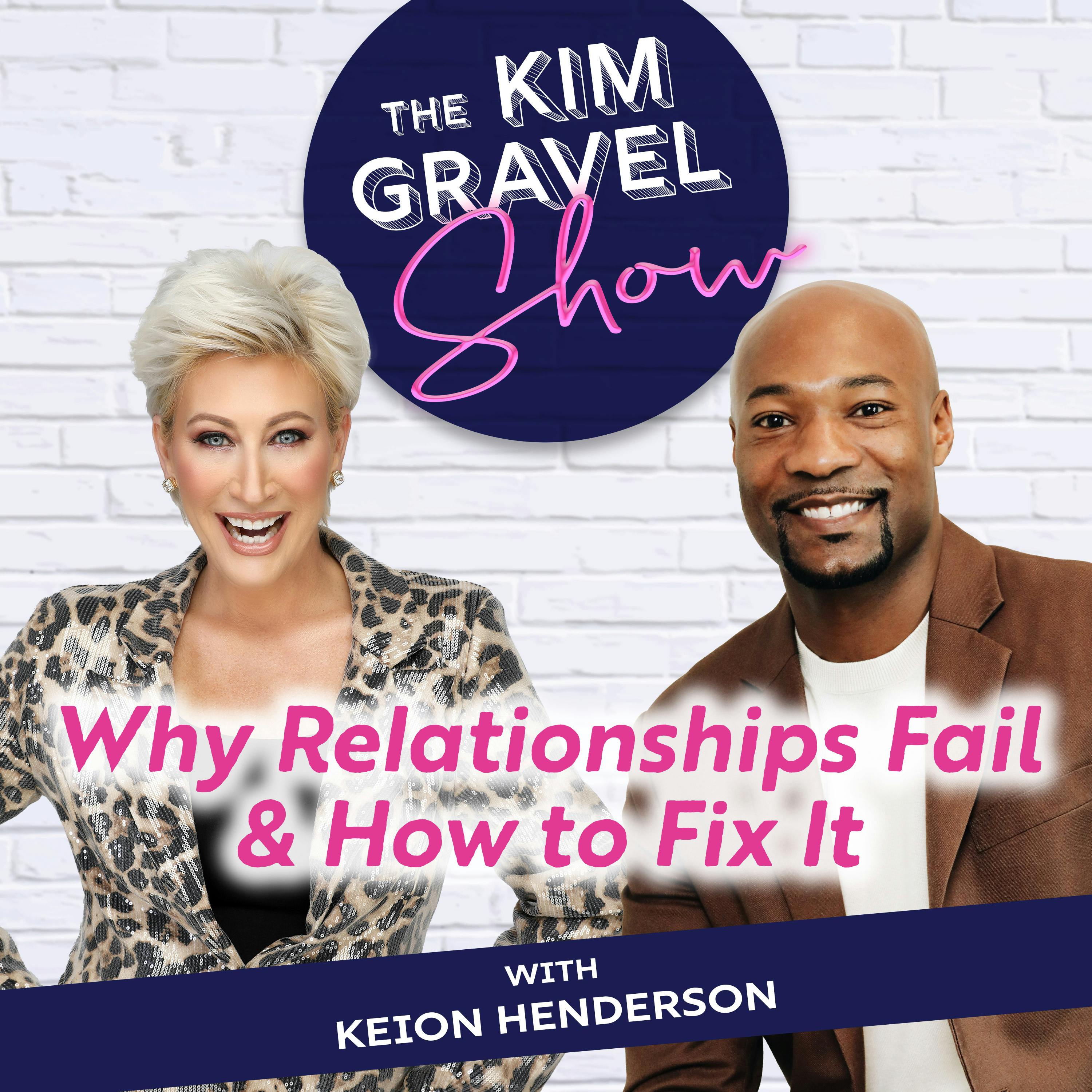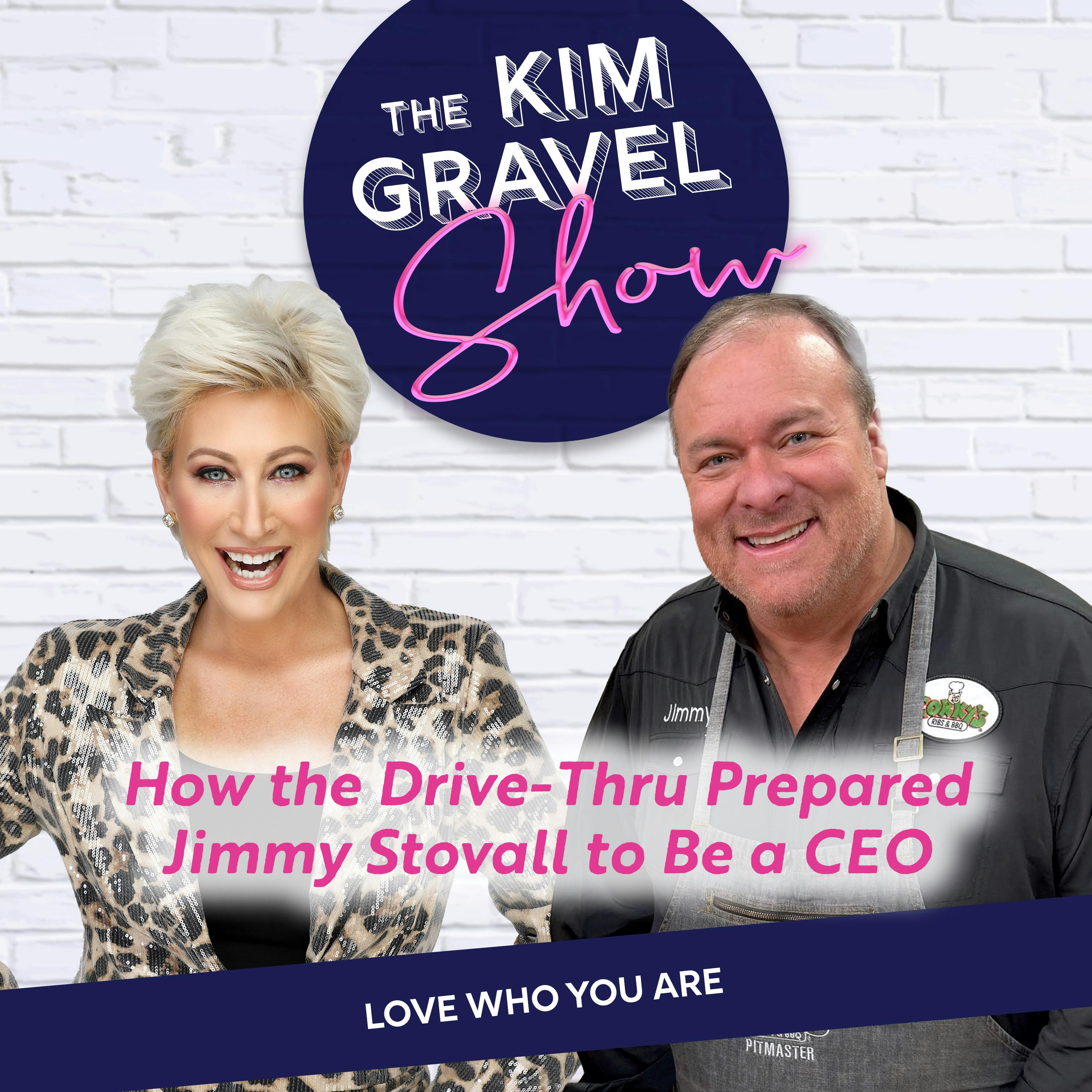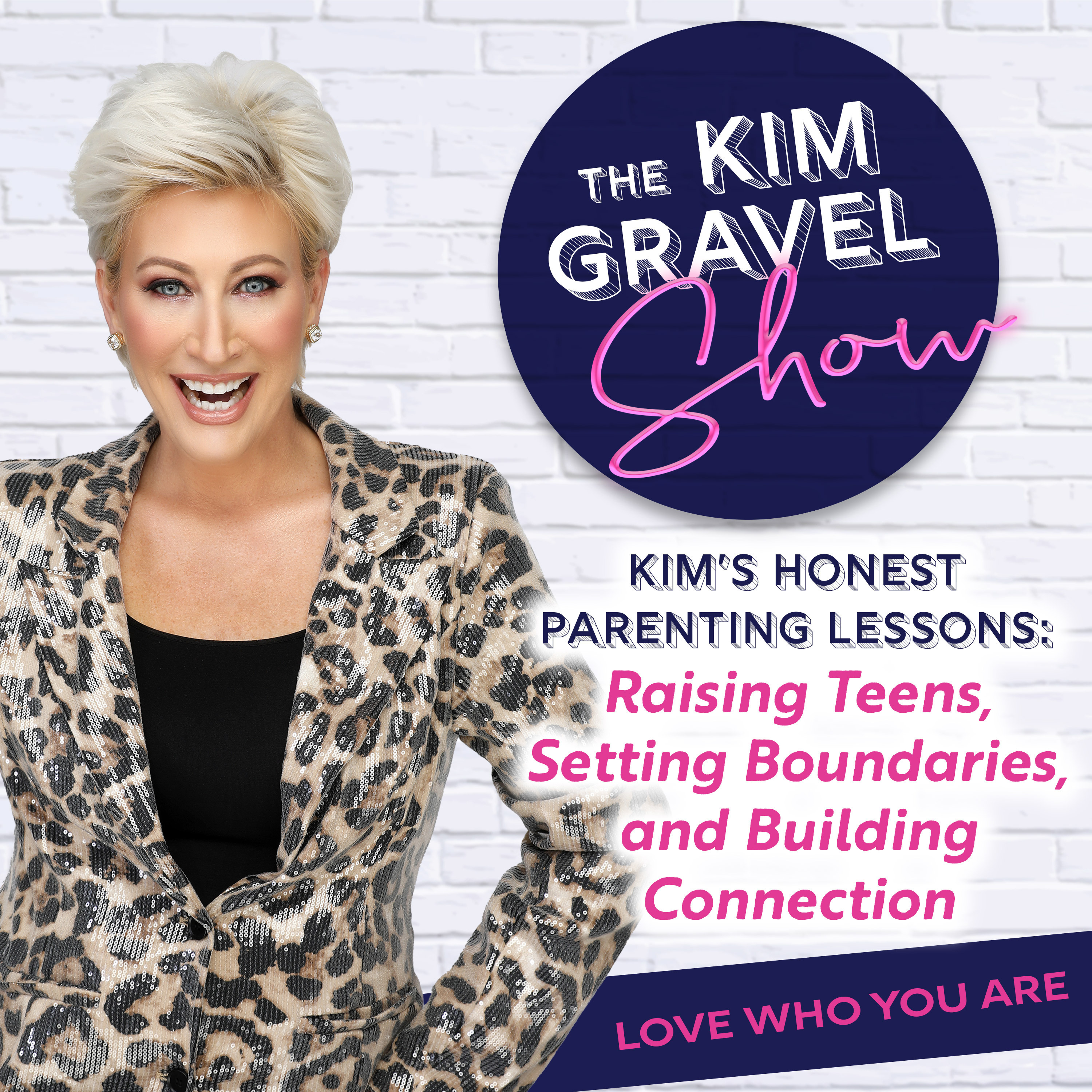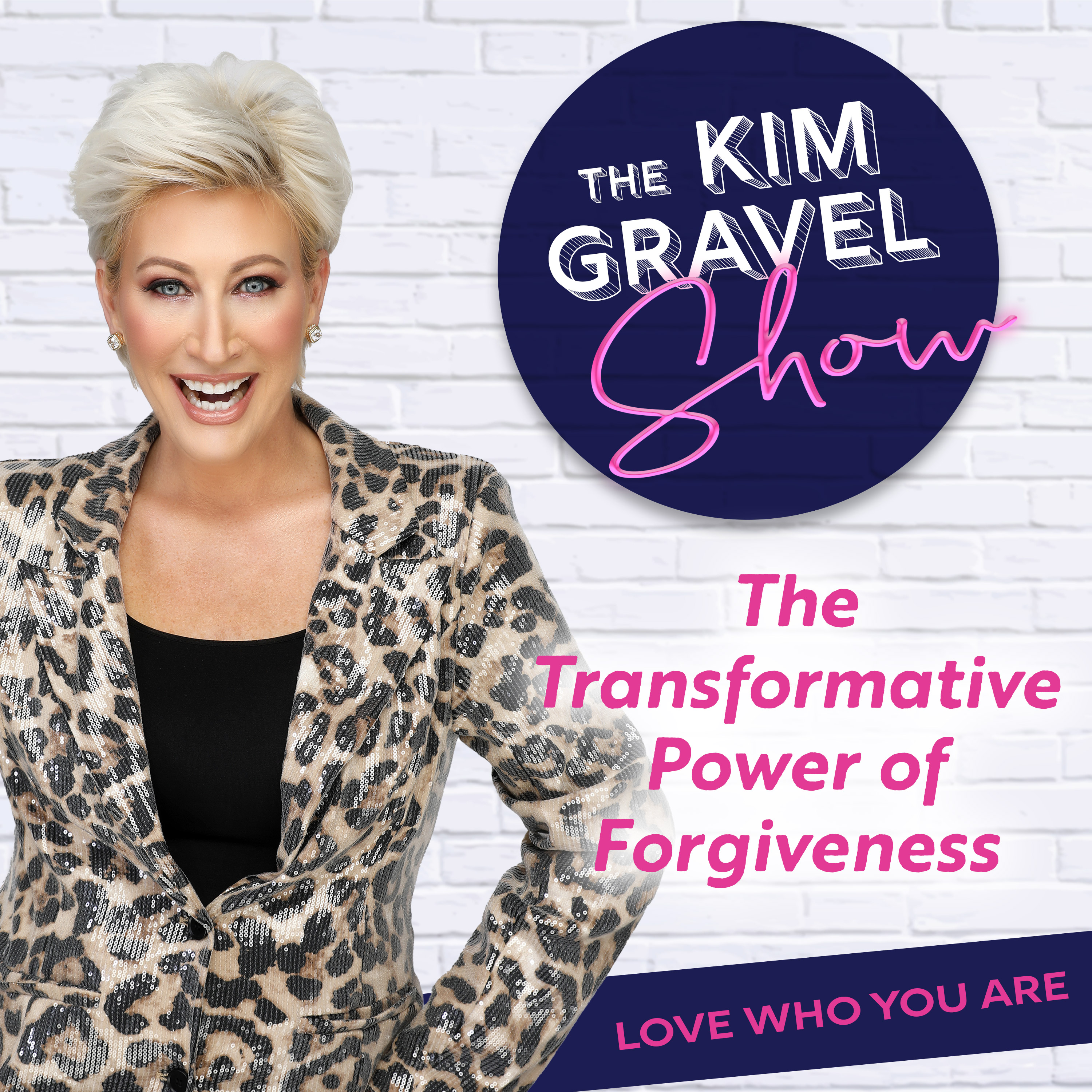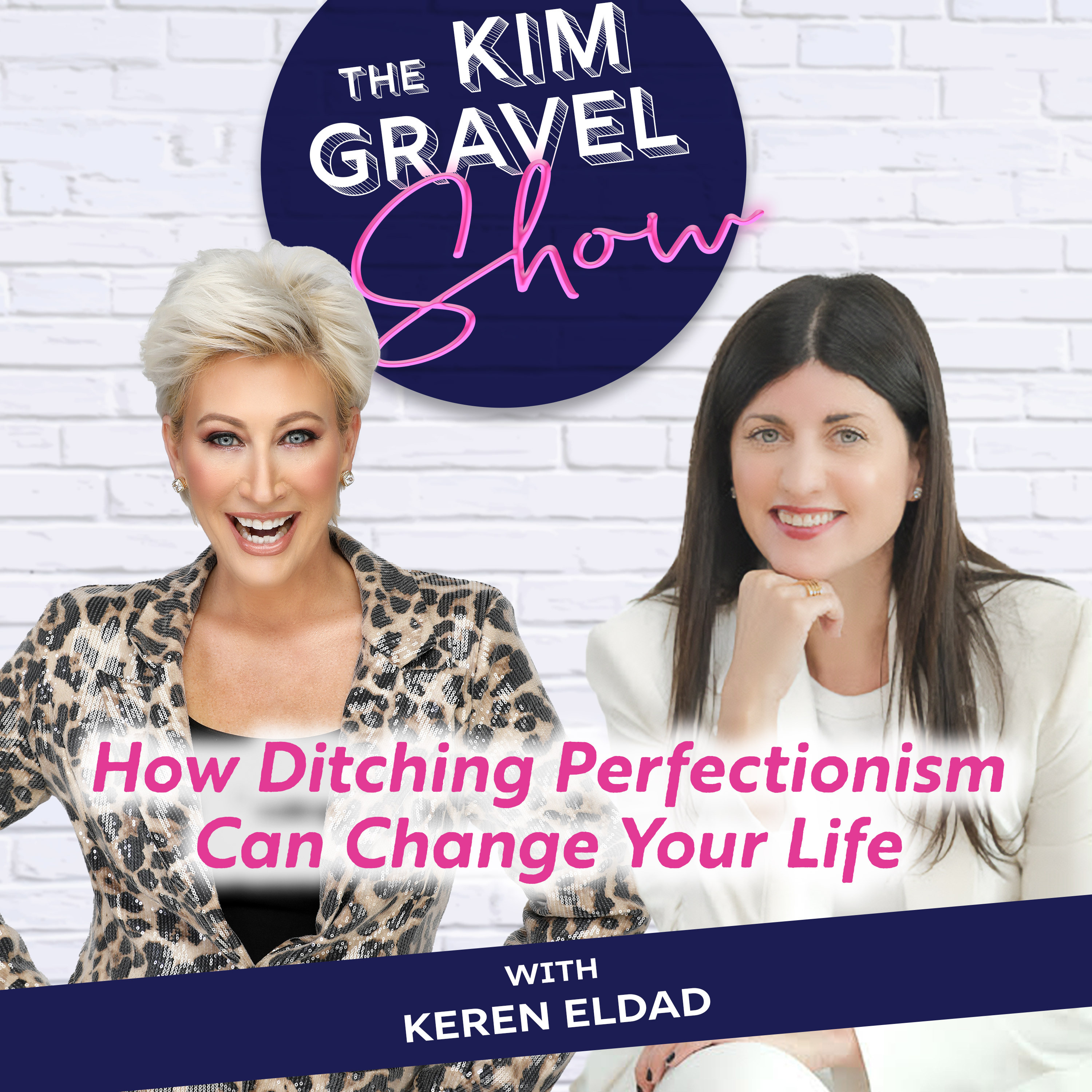Villain Voice - Negative Self Talk & How to STOP it

Are you hard on yourself? If you said yes, then this episode is for you, boo.
How often do you say to yourself, “I can’t do that because I’m not smart enough or pretty enough” or “I’m not good enough”. That voice in your head that is saying those things is not you. That’s your villain voice, and this episode will change the way you hear that voice forever.
This is one of my favorite quotes from this week’s episode:
“The opposite of negative self-talk is not positive. The opposite of negative self-talk is gratitude.”
In this episode:
- What is negative self-talk and why it's a habit
- How our past experiences shape the way we experience the world
- How negative self-talk affects our body and mind
- How to shift your perception and stop listening to your villain voice
- The importance of practicing gratitude
Make sure to subscribe! New episodes of The Kim Gravel Show drop every Thursday.
Order my new book: Collecting Confidence.
Check out my channel on QVC+ for full video episodes.
Connect with Me:
Sponsor:
Thank you to Factor for sponsoring the show! Head to https://www.factormeals.com/kim50 and use code kim50 to get 50% off your first box!
Thank you to BetterHelp for sponsoring the show! Head to http://www.betterhelp.com/gravel today to get 10% off your first month!
Learn more about your ad choices. Visit megaphone.fm/adchoices
*This transcript was auto-generated*
Kim Gravel: Coming up on The Kim Gravel Show. You want to know why you're not successful? I'm willing to bet you a dollar to a donut that it's your negative self talk. It's not your lack of hard work. It's not your lack of knowledge. It's not your lack of a degree. It's not your lack of being able to lose weight.
It's not the lack of being a, being, you know, broke. It's none of that. A lot of times when people say, well, I just don't have the motivation. I just don't have the energy. I just, I'm so tired. A lot of it is because of the, how you are beating yourself up to death inside of your head with your negative self talk.
And I'm telling you something, if you hit yourself across the face every single day, by the fourth month, you're going to be tired, boo. You're not going to be able to do much anything.
Opening Introduction: Let's just go on and spill the tea. This is The Kim Gravel Show. This is one of the realest persons I've ever met in my darn life. You gotta watch this. My mission is to encourage every single woman, we're here to lift y'all up. There's no one more effective than moms. You mess with the bull. You going to get the horns. I need coffee. I need Jesus and I need therapy. If you can bring a smile to people's faces, why would you not? We love our kids. We love our husbands. What a blessing. We're gonna dedicate this to you in finding your superpower. Okay girl. True confidence is knowing who you are and why you're here.
Kim Gravel: Hey y'all, Kim Gravel here and this is The Kim Gravel Show. It is a weekly podcast where you come and hopefully you listen and hopefully you take a few nuggets away that help you level up your life. That is the whole purpose of doing this show is to give you just a little bit of, you know, shot in the arm, a little, a little kick, a little, A little, you know, hug, whatever you need to get your life to the next level.
Hopefully this show is giving you that every time you listen. This week is you got to listen. Okay. Don't stop. Don't press go. Don't press stop. Whatever. You know, what's that saying, Zac? Don't press go. Don't collect 200. What is it?
Zac Miller: Oh, don't. Yeah. Do not pass. Go. Do not collect 200. That's like monopoly. I feel like I need to be turning my mustache, you know, my whatever.
What's that called?
Kim Gravel: Maniacal. No, just, you just need to stop and listen. So don't keep moving right now. Listen to this episode because you know what this is called. We're calling this episode the villain voice.
Is that a villain or a witch? I don't know which way to take that one.
Zac Miller: I don't know . So can I just say I fell down a little bit of like a sound rabbit hole because I have this one too.
Kim Gravel: Oh, that's a good one. Keep that one. You're going to need it for this episode. Keep that one.
Zac Miller: There's a lot of those.
One of these sounds was like an 80s sound and then I fell into like an 80s trap and I just, I'm going to take us off the rails right away, Kim. Ready? Because you're going to like, I put this on the board because you're going to love this. Ready? Ready?
Kim Gravel: Well, that's the hero sound.
Zac Miller: Yeah. Right. That's like our 80s. If we were doing this show in the 80s, that would be our intro.
Kim Gravel: Well, listen, take me back to the 80s. We're going to talk about today what the villain voice means, because we have that voice inside of our heads. And what I mean by villain voice is, Zac, I'm talking about that negative self talk. That's it. Thank you for that one because it's the truth. And that is, that's what it is in a, in a soundbite. That's what it is. It's that talking that we always say to ourselves, you know, everybody says the haters, the haters, the haters, we don't really need a bunch of haters because we are our own haters a lot of the times.
So if you struggle with that negative self talk, that villain voice inside your head here. Is the episode for you now, we're not gonna be able to tackle everything Zac in this episode But we are going to talk about what how that affects you physically mentally chemically emotionally and even how it It affects the walk of your life and how you live out your life.
But we're also going to talk to you about how to combat that villain voice, how to be the own superhero of that villain voice in your own head. Because it's important that a, we're aware of it and B, we have some tools to combat it because like you said, a lot of times we're drawn to that villain voice.
You know what I mean?
Zac Miller: I'm really excited because this is something I know I struggle with. All the time.
Kim Gravel: Once we get back, we're gonna take a short break. We're going to dive in with some scientific research of what this negative self talk that villain voice does to your brain and how it manifests in your, in your body.
And also how to combat that right after this.
Hey y'all, we are reviewing the review, meaning we are taking your reviews of The Kim Gravel Show, the podcast, and we're going to review what you said. How you reviewed the show we're reviewing your review of the show. Does that make any sense?
Zac Miller: I think so. It makes a little bit of sense. But can I ask you a question, Kim?
Sure. Because I'm curious. What would, like, you're really easy on the reviews. You've never given less than five stars. And I feel like, what would, what would it take to, for you to give like a one star review to a review?
Kim Gravel: Just somebody who don't review. If you don't review, you get a one star.
Zac Miller: Oh, so, so like most of the audience, honestly, as a one star review, that's messed up.
Kim Gravel: This is the thing about reviews. I,because, you know, in my world at QVC, we live and die on the reviews. So that's why we're saying, please go and review. I don't even care if it's a bad review. I'll take a bad review. A bad review is better than no review at all. It's like that publicity, you know, thing, but don't leave a bad review, honey, don't
Zac Miller: I feel like I disagree.
I don't want bad reviews. I will keep me up at night. Kim's got a thicker skin than I do. I do. I'm very thick skin. Let's see what Michelle has to say. Michelle left this review truth. And I yell that because there's like Three exclamation points. Love, love, love this woman. Kim is sharing her story, speaking her truth, living her purpose to help us all do the same.
You go girl. And then there's like another six exclamation point. There's a lot of exclamation points in this one.
Kim Gravel: I have to give this a five out of five. I know you say I do it all the time and I'm gonna tell you why. for the sheer punctuation alone. I am a punctuator person. So when I've tried to get my point across, I mean, I have to stop.
Cause everything in my, like when I write a review, everything is like truth. Exclamation, exclamation, love, exclamation. I am a very punctuator. I'm a punctuator. That's what I am. So Michelle, I give you five stars. I love you right back. Yes, I am speaking, or trying to tell my story. It's always evolving and changing, and all of us are.
And that's why we're here doing the Shozak. It's because we all want to do this thing together. And, so please, go review. And you never know, we might be reviewing your review.
Zac Miller: That's it. Go to our website, kimgravelshow.com. Check it out. Leave us a review. Leave us feedback. We want to know what you think. We really actually want to know what you think.
I mean, I think that's the thing, right? Like it's, it makes the show better. It makes it more of a community and that's what it's all about.
Kim Gravel: It does. That's what it's all about.
Zac Miller: All right.
Kim Gravel: So if you are a person who deals with negative self talk, and I'm going to say that not only just negative self talk, but a negative self thoughts too. So it's the talk and the thoughts. That's that villain voice. Because a lot of times the villain voice is not audible. Okay. And we're not talking about what people say to you.
We're talking about what you say and think about yourself today. Okay. Now, Zac, you've done a little bit of research. And when you sent this to me, I was blown away by the science behind this.
Zac Miller: I was blown away too. I feel like, so I, I'm like overwhelmed with so much stuff to talk to you about because Right.
It's can't get into all of it. So I find this so interesting. So if I get like too nerdy, just like, bring me back, Kim. Just pull me back in be like Zac.
Kim Gravel: I love a good nerd. I love a good nerd moment.
Zac Miller: Yeah. So first thing I'm gonna hit you with Ready is reticular activating system. Okay. So that sounds like, what is that, you know, it's basically, it's a part of your brain and it's the part that focuses your attention.
Okay. So the really cool thing about it is that, like, without it, you're just overwhelmed with everything that's hitting you. Like, imagine you're in like a busy restaurant, right? And there's lots of conversations going around you, but you can focus on the person you're talking to and you can hear their voice through the noise because of your reticular activating system.
And that serves a really important purpose. It makes it so you see the world in a certain way, but it also reinforces the way that we already see the world. So it creates biases, it creates, like, shortcuts, right? Like, we know what it's like when we walk into the grocery store. Like, we know what to expect.
And if something is totally weird and off, like you will know immediately because it's like, not part of the shortcut that you have in your brain for this is what it's like at, you know, what's the name, what kind of grocery store do you shop at Kim?
Kim Gravel: Publix, you know, I'm married to Travis. So wherever anything's on sale for the week.
Zac Miller: Why am I talking about this?
Because. We're so bombarded with information. We need to have these shortcuts. We need to create these, you know Whatever you want to call it.
Kim Gravel: It's almost like coping. It's almost like a coping mechanism, right? We're getting somewhere with this y'all hang on.
Zac Miller: Yes. It turns out the way that we think about ourselves and the way that we interact in all those situations is a big part of that.
So right we understand ourselves Well, you know i'm Not a great public speaker. So then when you go into a situation where you have to speak in public, you aren't necessarily as good. You aren't as confident.
Kim Gravel: You believe it and it manifests that way. I'm going like this. Bing, bing, bing, bing, bing, bing.
You know, all the light bulbs are coming on.
Zac Miller: Well, that's the thing, right? So you start seeing the world this way and you're like, look, we, we are categorizers, right? Another way to think about this. There's a few ways to think about this. We put things in categories. Right? What category are we putting, you know, our relationships and what category putting our work in?
What category we're putting are all these things that we think and feel. And these shortcuts like they help us. They're all part of that reticular activating system. But They also can harm us. It's like the thing that really clicked for me when I was researching this was the word habits. And I was like, Oh, our thoughts are habits.
Our thoughts are habits. So if I have a habit that's really healthy, like going to the gym every day, that's great. That can help me. If I have a habit that's really unhealthy, like eating junk food every day, that habit's hurting me. Our thoughts are exactly the same way.
Kim Gravel: I know, Zac, but I'm going to add a little caveat to it.
I don't know if that's the right word. I'm going to add a little something to that and say it is so much easier to develop bad habits than it is good habits. It's so much easier to negatively self talk. It's so much easier to have the villain voice. As opposed to listening to the good and and that's what we're going to be talking about today.
Zac Miller: Let me just let me just play you one little clip that I found and I want to hear this is amazing. I want I want you to take it away but but what the point of this clip is and this is what I want you to I'm going to tell you what you're going to take away from it before I even play it because it's so important.
The way that you understand the world, all of us, every single one of us, the way we even hear the world and see the world and experience it from the moment we get that information into our, you know, through our ears, through our eyes, into our brain, depends on our previous experiences.
Kim Gravel: Amen. Okay, here we go.
NPR All Things Considered Clip: Listen to the sound, and see if you can figure out what words are being said. The juice of lemons makes fine punch. Wow, that sounds incomprehensible. Now, now, now listen to what the sentence actually is when it's not garbled. The juice of lemons makes fine punch. The juice of lemons makes fine punch. Now listen to the first sentence again. The juice of lemons makes fine punch. The juice of lemons makes fine punch. Now it sounds totally clear. I absolutely hear the juice of lemons makes fine punch. What are you showing us there? Right, so, so do you believe me? That what you know about sound? Influences how you make sense of it. Interesting. Our previous experience shapes our interpretation of the sounds we encounter in the world. Bingo.
Zac Miller: It's so interesting. You will literally hear things differently. Like, So that's a clip I should say, I should give credit. That's a clip from NPR, from All Things Considered. It was Ari Shapiro talking to neuroscientist, Nina Kraus.
Okay. And she wrote a book on how we understand the world. It's really interesting stuff, but, think about your favorite song. Like, what's your, what's your favorite song, Kim, or one of your favorites?
Kim Gravel: Oh, gosh, one of my favorite songs. Like, I don't know. I've got so many. Right now it's probably, I just went to church this morning.
It's probably, I'm going to say Yahweh by U2. Okay.
Zac Miller: Yeah. So what do you think when you hear that song, it probably means something totally different than when I hear it, right?
Kim Gravel: Correct. Correct. Yes. And it, it, it, it, it invokes a feeling and it invokes a good feeling from good past experiences. And it makes me feel, alive and more confident.
I mean, you could do that when you're driving down the road and you flip on your radio and you hear this great song and your mood changes completely and your attitude changes and your vibe and energy, everything changes. The same thing happens when you do the negative self talk when you listen to the villain voice too, right?
Zac Miller: Right. So yeah, so let's talk about the villain voice. And that's where I think, like, I'm going to hand it back to you, Kim, because I think just knowing that our brain is this muscle that is Is wired this way. Yeah, it's wired this way and is filtering the world a certain way. Now what happens? Like, what is that negative self talk?
What is that feeling of voice?
Kim Gravel: And all of, all of this that you have just said, Zac, goes back probably to when we were little. I don't, I don't think we, I don't think we are born and start looking in the mirror and, and start talking negatively or, You know, hatred or that villain voice. I don't think it starts there at nine times out of 10 starts either through an experience or what someone says to us that we accept and take on ourselves.
Okay, so let's just don't beat yourself up right now. If you're saying, Kim, I don't believe in myself and I, a lot of you really do. Hear me. Here's some hope. A lot of you really do believe in yourself. You know, you have a purpose, you know, you're created a one of a kind, you know, you have talents, but we have been in the bad habits of the negative self talk the villain voice for so long that that is just a default.
Now, just how we listened to that sound and we didn't hear it first. And then we can hear it. So today we're going to hear that voice a little differently so that we can actually hear the clear message that's coming through, even through our negative self talk. Now, let me tell you, this is what your negative self talk, this is what your villain voice is doing to you.
It's minimizing you. Okay? When you on a daily basis, go to the negative about yourself either thought wise or talk wise, you are dismissive of any strengths that you might have. Okay. You, you know, innately that you have positive qualities. If I was to call you right now or it's your house or why you're listening to this and I said, give me some positive qualities about you and you're, you've lived a certain amount of life and you're at a certain age and you could articulate, you could be able to tell me a few things, right?
So, you know, you have positive qualities. Then why do you still not believe in yourself? It's because you have minimized. Okay. Yourself verbally through the villain voice through that negative self talk so much so that now you're dismissive of any thoughts or things that come out of your mouth that are your strengths or your talents or your positive qualities.
Do that make sense?
Zac Miller: Oh, yeah, it completely makes sense.
Kim Gravel: You're in that habit of just talking, of minimizing yourself. It's not that you don't think you have talents and strengths, because I believe if we could talk right now one on one, you and I, you would be able to tell me some wonderful positive strengths and qualities about yourself.
It's the fact that you've probably minimized that verbally. And thought wise for so long that not only are you not able to verbalize them or talk to or say them, but you might be doubting that you ever had them. And so you're in total conflict. Zac, you're in total conflict with what you know in your soul and what you know in your head from the habits of negative self talk.
I'm telling y'all. Hang with me. I know this seems deep, but I'm going somewhere with it. Now, let me tell you something. Not only are you minimizing yourself. Okay. That means you're dismissive of your strengths. Then I'm telling oxymoron, but then you magnify. Or over exaggerate your weakness and flaws. Now, it's the villain voice.
It's why are we always drawn to the wrong and not the right? Why do we have to, I mean, listen, I grew up in church. Okay, people, why is it so much easier to sin than be saved? I don't know. I don't know. That's one thing I'm going to ask God. Why is it so easy to do what we should not do and we don't do what we know is good for us and to do?
I don't know. Maybe that's our fallen nature. Maybe that is just all the negative self talk that we are at the point where we magnify or over exaggerate our weaknesses and flaws. We can take a minor incident, a little blip. And I'm going to tell you about a blip. I don't know if I should tell this blip.
Let's do it. So I, I have a friend who has a son who, who, who has a problem with alcohol. Okay. And, he's actually a recovering alcoholic and we've celebrated his sobriety probably for two and a half, almost three years now. And she called me just last week and she said, Oh, he's off the wagon. He's off the wagon.
He is drinking again. I mean, she, and I'm not, I am not. Like, I want you to know, I'm not exaggerating her feelings towards this cause she was truly devastated.
Zac Miller: I mean, that is really, that's devastating news.
Kim Gravel: But I mean, I said, okay, okay. And so we broke it down. I said, was he laid out drunk in a ditch? Cause he has been there before.
What is it that happened? Okay. And her reaction was to magnify. A negative self talk immediately. Well, so tell me what she's saying. Well, I mean, he had two beers. He had, he had not been drinking for three and a half years. So the next morning, he called out of work. He has such a great job.
He has been on the straight and narrow for so long. And she just jumped to, you know, he's gone down the path. We're going to have to go to rehab again. The whole nine yards. Rightfully so the fear of all of that and had overwhelmed her, but she took that minor incident and turned it into something major and it was truly just a blip.
It was a, it was a rock in the road. It was a bump. It was a little bit of a pothole. Okay. She stood in the gap. We also in the gap praying. She stood in the gap talking to him and it was just truly a blip. Thank God. But I say all that to say that could have gone down that exaggerated road really, really quick.
So what I want to ask you, are you minimizing? Your strengths and talents through your negative self talk and villain voice. And are you maximizing or over exaggerating your negative thoughts, your mistakes, or your blips? Okay.
Zac Miller: For the record, like I'm great. At both of those things.
Kim Gravel: We all are, we all have the villain voice, okay, and we're going to get to the solutions here soon.
But I just want to break a few more things down for you. We also over generalize and I am so bad about this because I'm an extremist. I'm either completely freezing or I'm burning up. It's never a moderate, you know, I'm a little chilly. I'm never, I'm never that way. It's so true.
Zac Miller: I'm sorry because that's so true, Kim.
You really are like that.
Kim Gravel: Is that not about me? Can you not say that? Honestly, Zac. I'm either like, the sky is falling and this whole thing is going to hell in a handbasket. Or... It's the best thing, pull out your parade and let's march down the road. I mean, it's, it's, I,I have to, that's my natural bent.
And that's a bad habit for me too, but that's what I'm talking about. We do that with our negative self talk. We'll say, my kids never finish their homework. Or I'll say, you know, I never get a good time slot. And shows, you don't say it like it's all these over generalizations, the words always never, you know, you might have like, I,Amy says this all the time.
She gonna kill me for saying this, but I don't care how to you, my friend, you go get run over by the bus. So here we go. But Amy, I'll say, I just can't. Do it again! Do it again!
And whatever you do, don't send that to Amy. But Amy often says that. She'll say, I can't, I'm not getting on those dating apps because I'll never find anybody. Okay. Now, I'm not saying Amy, you need to go on the dating apps. I'm just giving you an example of over, over generalization. What are you doing that with in your life?
Are you all, you know, are you always left out or you're always, you know, you're, you, you fight with your husband always. And I've caught myself doing it. And this is the worst thing I do. I'm telling you over generalization. And it's just that, you know, extreme, always, never. It totally limits and feeds that villain voice in our, in our head.
Another one is personalization. It's so weird because. I think we think naturally that this is deep. Okay, I think we think naturally that we place the blame on other people. The majority of the time. Okay, now y'all stay with me. And we've all known those people that it's never their fault. It's always someone else's fault.
But more than not. We take the responsibility on ourselves, at least mentally, emotionally and through our words.
Zac Miller: I think this is this is the one for me that, like, is the most true. And I think, okay, if I'm gonna call you out, Kim, I think you do this with your kit. I think you take responsibility for their behavior.
Do you think so?
Kim Gravel: All the time. All the time. Zac, I think we all do this, but, but, but society will tell you, we are, we're the blame game. Society will tell you the majority of people will blame others for their faults. But, but I believe, and I think, I mean, I can't scientifically prove this again. I'm not a counselor, a psychologist.
Or am I a scientist by any means, but I can just talk from my lived experience that we often more than not personalize and take a lot of the responsibility on ourselves. And even though we say we blame other people internally, we take it on, especially moms, especially parents. You know, when we do that, we are carrying a load y'all that we were not made to carry.
Okay. We're not. And this negative self talk, it, it, it reinforces negative beliefs, this filling voice, it impacts our thoughts and our feelings, our reactions. It even impacts our motivation. Okay. A lot of times you, people, people say to me all the time, I just can't get motivated. I'm so tired. Listen to me.
Listen to me. Listen to me. Listen to me. A lot of people say, I just snapped. Oh Lord, I do that. And when I get excited and fired up.
Zac Miller: Let's snap it. Here. I'll just, it'll be like
Kim Gravel: a lot of times when people say, well, I just don't have the motivation. I just don't have the energy. I just, I'm so tired. A lot of it is because of the, how you are beating yourself up to death inside of your head with your negative self talk.
And I'm telling you something, if you hit yourself across the face every single day, by the fourth month, you're going to be tired, boo. You're not going to be able to do much, anything. Okay, because remember all that negative self talk is a bad habit that that manifests in other parts. Okay? Also negative self talk leads to social isolation.
Have you ever been there? Have you ever been where you have you have talked yourself down so much that you're afraid To even have social interactions because you feel so bad about yourself negative self talk leads to isolations Zac.
Zac Miller: Okay. So for me, Kim, I've just, I'm going to jump in for a second because that to me, like I'm, I'm someone who I will look at the negative stuff and then I'll think that other people are thinking negatively about me for no reason.
And it's like, Oh, I haven't seen this person in a really long time, or this person hasn't reached out to me. Like they must be thinking about like, whatever. Honestly, random thing that I'm probably the only one that's thinking about and like thinking that I'm being judged, thinking that I am the problem, but
Kim Gravel: can I say something?
I'm just going to prove my point here. That's the personalization that's taking that responsibility. Okay. There's a little bit of that. Okay. And it leads to isolation because then you're thinking, I don't know what they think about me or I don't like a lot of people say, I don't care what people think about me.
Bull. Okay. That's a lie from the pits of hell.
Zac Miller: I'm not here to make friends, Kim. I'm just here to win.
Kim Gravel: I'm just saying, that's a lie. Everybody cares what everybody thinks about them. It's, it's the habit that we get into that becomes the problem. It's the negative self talk and that villain voice that happens that we can't stop and go, you know what?
Wait a minute. You know, I'm saying it's not the fact that we do it is the fact that it becomes a habit. Okay, listen to this This is this is a biggie. Okay, cuz we're all here to level up our lives, right?
The villain voice the negative self talk it lowers the ability To see opportunities for yourself and to capitalize on them. You want to know why you're not successful? I'm willing to bet you a dollar to a donut that it's your negative self talk. It's not your hard, it's not your lack of hard work. It's not your lack of knowledge.
It's not your lack of a degree. It's not your lack of being able to lose weight. It's not the lack of being a, being, you know, broke. It's none of that. If we were to trace it back, I bet you anything that you are not able to seize, excuse me, that you're not able to see opportunities and seize and capitalize on those opportunities because of your negative self talk because of that villain voice.
It stops you from being able to see what is real and what is opportunity in front of you. It shifts your perception. It shifts the way you look at stuff, and it shifts the way you think of stuff. Now look, I'm not saying get out there and be a total narcissist. Alright? I'm not saying that. But to be honest with you, I don't think there's much of a danger of that for most people.
And people say, we live in such a narcissist society. Everybody's doing selfies, and everybody's doing this, and me, me, me. They're doing that because of the negative self talk.
Zac Miller: They're counteracting. It's like a way to counter it. That's it. It's a way to take it outside. Oh, Kim. Okay.
Kim Gravel: But wait a minute, but wait a minute.
Okay. Zac, I can. I've got some steps on how to counter it. I really, really do. Okay. Okay. And when we come back from the break, I wanna talk to you about how you can beat this villain voice, or at least tackle him to the ground and knock his lights out as many times as you need to. After the break.
I'm gonna show you how to do that.
Are you ready to be the Marvel hero in your mind and squash the villain voice once and for all? And when we're talking about villain voice, y'all, we're talking about that negative self talk. And before the break, I was breaking it down of, what you do when you talk to yourself negatively. Even Zac was just kind of giving us a little scientific background about how, you know, we recognize that negative voice.
You know, we, we, we can hear that one, but it's hard to hear the truth, right? Cause it's based on what we're listening to. Is that, isn't that what you said, Zac?
Zac Miller: Yeah. And it's, it's hard not to pay attention to it. Like this, this is the voice. I don't know about you, but like I have actually, I'd be really curious to know this because I think it's different for different people.
Do you constantly have like an internal monologue? Are you constantly talking to yourself just all the time? Just like you're hearing, you're talking to yourself.
Kim Gravel: Let me ask you something. How often do I talk when we're talking? Answer the question.
Zac Miller: So the answer is a million percent yes.
Kim Gravel: A million percent yes.
And even the people that don't talk a lot are talking a lot internally.
Zac Miller: Right. Yeah, I think most people do. But some people don't. I think that's really interesting actually. Some people don't have that. Very rarely. Fair. We don't have what don't have what like they, they just experience thoughts differently.
Like I think some people don't experience their thoughts necessarily as sort of like this internal monologue. This is like totally off the rails.
Kim Gravel: Oh yeah, yeah, yeah. Not interpret. They're thinking thoughts.
Zac Miller: More like vibes. It's more like, it's harder to put words to.
Kim Gravel: Let me ask you this before we dive in to, to how to counteract this.
What do you think about most? Oh, what do you think about? No, I'm serious. I'm serious. I want you to answer these questions. This is this is okay. This is important. What do you think about most? And when I say what that could be who, what, when or where? What do you think about most?
Zac Miller: I mean, I think that, okay,
Kim Gravel: we're gonna drill it down.
So you better be honest because we drilled all the way down. You know me. I'm a driller.
Zac Miller: Well, right now. Okay. So like right now, when we're recording shows, when we're recording shows, I'm constantly like, Okay. Sort of second guessing myself, like, like, like, okay, is what I, I could say something here, right? I could jump in and I could say something to Kim, but like, is it worth it?
Does anyone actually care? You know, does anyone really care?
Kim Gravel: So what are you thinking about when you're with the kids in the family?
Zac Miller: Oh, 100 percent like don't die with the kids. I'm just thinking about just all the ways. And this is another negative thing that we do. I think as parents, especially like I'm, And I think this is also like the narcissistic, like, whatever, there were certain traits of that in my own childhood, but like, not narcissistic, what's it like when you're always thinking about the worst possible outcome?
What's that called?
Kim Gravel: A pessimist?
Zac Miller: Yeah, like the pessimistic, like, oh, okay, yeah, they're climbing on the couch, like, they could fall, and they could hit their head, and oh, maybe I should move that thing.
Kim Gravel: So what are you thinking? Like when you used to be on set, like it came of queens, what, what kind of, what, what do you, what are you always thinking about?
Zac Miller: Oh, just constantly time, time, time, time, time, time, time, time. We're behind. We're not on schedule. We, we are, you know, something is going to get messed up. Like why aren't, you know, yeah, a hundred percent, like just, and stress, the stress of time pressure.
Kim Gravel: Okay. How many times are you thinking about yourself?
Zac Miller: All the time, the other thing I think I don't like my hair right now. Like I don't like it. So I think about it all the time and then I find myself doing this and like, I find myself touching it and I'm like, why am I messing with it? What am I doing right now?
Kim Gravel: So that's my point about all of this.
That's my point about all this. Cause you had said some people process thoughts differently. They absolutely do. But everybody processes thoughts through the filter of themselves. Yes.
Zac Miller: And that doesn't mean you're obsessed with yourself, right?
Kim Gravel: No, it doesn't. It's very human. Yeah. It's very human. Because when it's all over, and this is my faith and my belief, when you stand before God and he is, it's you and him, he's not going to say, what about your kids, Zac?
Or what about this? He's going to say, what about you? And so we are wired to think about ourselves. Yes. We are wired. To be drawn to the villain. Yeah. It's easier to always be thinking the negative, babe. It's so much harder to be thinking of how this could be for my good.
Zac Miller: Yeah, and just be like, oh, I wish I was blank.
I wish I was doing blank. I wish this was easier. I wish this was better.
Kim Gravel: Yeah. What I'm saying to you is, yes, everybody processes thoughts different. I have a, I have an internal monologue that never shuts up. You know, everybody else might have. They might be, you know, analytical driven and, and, and data driven.
And that's all they're thinking about. But I promise you everything can be filtered back through the word I and me. And that's why it's so important to squash this villain voice, or at least, use the proper tools to get ahead of this or get ahold of it or understand that it even exists. Okay. And, and.
That, that's the first way to really combat negative self-talk is you've got to notice that you're doing it. Okay? You can't fix a problem. You don't notice a problem. So you have to notice that you are doing it. And, and, and that means really being aware of what your thoughts are and what you say. And so I, I tell the story all the time.
Remember when I put the little tape recorder, this digital tape recorder on my, on my being?
Zac Miller: Yeah. Wait, wait. Tell that story again for folks who didn't hear that episode. 'cause that was amazing.
Kim Gravel: In the book, Collecting Confidence, I talk about how I did this exercise with myself and I had this little digital recorder.
Now, this was way before we had iPhones or what have you, and it was just this little digital recorder and I placed it and I listened. I just I press record all day. I think I had to stop and change the batteries one time or whatever. And then I went back and listen to it like a week later and it was over 200 negative things that came out about my came out of my mouth about myself or my situation.
200 And then I think it was like a 10 hour period it was psycho now That's not even counting the things I was thinking.
Zac Miller: What what kind of stuff was it? Like what kind of what was can you give us an example? Like what
Kim Gravel: it would just be even self deprecating. So people say kimmy looks so good. Oh, honey. I'm so fat.
I've gained 10 pounds Not even things that I was like trying to beat myself up other just so like, Oh, honey, I'd go through drive thru. Oh, honey, I don't need this coat, but go on and give it to me. I, you know, just negative, just, just looking at life's disabilities as opposed to the possibilities. Okay? So you gotta notice that you're doing it.
Zac Miller: Can you take a compliment, Kim? Can you take a compliment?
Kim Gravel: I can't take a compliment without combating it with self deprecation. It's a struggle. I have started saying, like somebody said, Kim, you look real pretty. I say, thank you, you got great taste. I've started, I've started making myself and people always laugh when I do that because I always love to get a laugh or I'm a person that loves to put, put the room at ease or put people at ease because I've always, wanted to make sure everybody was included, you know, um.
So I would, I would down myself so that people wouldn't think, Oh, she's cocky or she's this y'all. I'm telling you, it's a mind trip. What I'm saying, it manifested comes out. The villain voice comes out in different ways. Some people get very angry and they just become the daggum villain. People are like, well, if you can't shoot them, join them.
You know what I'm saying? It's some people are just like they give over to those negative thoughts and become the alcoholic, the bop, bop, bop, the cheater, whatever. Yeah. That we think we're beating ourselves up. Remember, my friend's son just had a blip. Yeah. Okay? Just Okay, so you gotta notice you're doing it.
There's another thing I can say to notice you're doing it. You can do the type recorder, or every time that you have a negative thought about yourself, write it down. Like, just put it on pen to paper. Or, have a family member say, or a friend or a co worker or whatever say, Girl, you're being negative about yourself.
Give people permission to call you out. Yeah, I like that. You can't fix something you don't know you're doing. Okay? Separate your villain voice from you. Okay? We, like that personalization thing we talked about earlier before the break, we take things on very personally that really are just things that It's just a stupid thought.
That's why I think it's very important to call it what it is. It is the villain voice. It's not you have negative self talk. It's just negative thoughts that have no power, right? It's not, you're going to have them. Don't sit here and think it's not you. And don't sit here and think, Oh my gosh, I'm going to be able to get rid of every negative thought.
I have about 50, 000 negative thoughts a day. I just don't give them any power. I know, I know what they are and I can recognize them for what they are. Okay? Treat yourself like you would a friend.
Would you ever go to a friend, whether they were struggling with something or not, whether it was real or not, and say, Girl, you are so fat. Are you ever going to lose your fat butt? Would you ever do that? Would you ever go to a friend and say, Girl, you are so ugly. Why are you wearing that? You would never do that.
You probably wouldn't even do that to a total stranger, unless you're like a troll on social media. That's a whole nother episode. Those people talk about villain voices. They've got them all through their bodies.
Zac Miller: That's a whole, that's like, you know.
Kim Gravel: But Zac, we wouldn't do that. We wouldn't do that to a total stranger.
Why do we do it to ourselves?
And, and, and it's, it's ridiculous. Honestly, when you think about it that way, you're like, yeah, that's dumb. Why would I do that?
Zac Miller: That to me, that piece of advice, that piece of it for me clicked. And I, all the time now, I, I'm telling myself that ever since like, we've started to, you know, talk about this and talk about how we were going to put this episode together.
It's like, would I say that out loud? Is this actually something I would ever say out loud? And if the answer is no, then it's like, well, then why?
Kim Gravel: Let's talk about that. Let's talk about that. Cause it's not even just, that's a great point. Zac, I think we should lean into that a little bit because not only like.
Would you say it to a friend, but would you even say that out loud, right? What a lot of things we think, think about a lot of things we think about ourselves. People would say, are they mentally okay? Do you know what I'm saying? Like if you said it out loud, if some of the things I thought about, I said out loud, because keep in mind, it's just a passing thought.
It's a blip people. It ain't. It don't over exaggerate what it is. It's just a passing thought and you know, my husband's biggest thing. Oh my gosh, with the kids. I love this. I thought this was a great piece of advice that he gave our our sons. He said, just because you think it don't mean that you need to say it.
He said everything he said everything he said it to me before he said everything you think Kim don't need to come out your mouth so true.
Zac Miller: You can't say that to a podcaster though. That's like, that's the opposite of what we're doing here.
Kim Gravel: This is, but there is truth to that. Okay. So, so, so, so the last thing I want to tell you is maybe replace that villain voice.
And this is so said a lot, and I hate, I hate to be cheesy right here at the end, but I'm going to have to go there. Replace the villain voice with the practice of being grateful. And people are like, Oh God, people get so tired of hearing that. I know you're supposed to be gratitude, you have a gratitude journal, and I'm not making fun of that.
Okay. I'm just saying, I know you're sitting here going, Kim, really tell me something I don't know. Because, but it's so true. It's so. True that whenever you hear I'm not enough in your head with that negative self talking villain voice, remind yourself why you are. And it's that attitude of gratitude that really shifts the way you talk, think, walk, and, and it's the, it's the truest form of humility.
Being humble is not being self deprecating, being humble and, and, and being in a state of humility is not downplaying yourself. It's praising and having gratitude for your many, many blessings that you have. And I'll tell you, if you want to, I, I heard this the other day. I thought this was fantastic.
The opposite. Of negative self talk is not positive self talk. The opposite of negative self talk is gratitude. Now that's deep. Yeah. Because, because we never have, we're not good enough anyway, y'all. We're never going to be good enough. We're never going to be, I mean, we're such a performance driven society, but we never can outperform our way into Positivity.
I know so many people that are maximum elite performers in athletics, in business, you know, multi multi millionaires that still have this negative self talk that still have this villain voice that eats them alive. Success does not outweigh the negative self talk. The positive thinking when I know a lot of people who I mean, I've known an influencer who was, who, that's his whole career was positive self talk and he took his own life.
Being positive does not negate the negative self talk, gratitude does. Because what you're grateful for is real. Negative self talk is just a mental habit. That is not. Can I tell you how you do that on a spiritual level? Can I tell you how you do it, you know, we've given you some practical ways, but there's a scripture in the Bible, and for those of you, my major in college was theology, so I always thought I was going to be a preacher.
Don't laugh are in some ways you kind of are. Okay, but don't I'm just saying like really kill date. No pulpit Go give you the rain and frightfully some they shouldn't really.
Zac Miller: I don't know. I don't know. Here we go.
Kim Gravel: Well, we all live out. We all live out our life's call in the way, you know, he has it for us But there's a scripture and I I want to look it up and and you can read it on your own.
It's psalms 45 one And part of it says, my tongue is the pin of a skillful writer. There's another version where it says, my tongue is the pin of a ready writer. And, and, and, and as a person who loves to dig deep, I know you think, really, Cam? I do. I love to dig deep. And I know I want to know the why, because I think.
Words are so powerful and they're things and they're alive and they get all over things. And you know, that whole phrase sticks and stones may break my bones, but words will never hurt me. That is not truth either. That's a lie. But when the scripture says my tongue is like the pen of a skillful or ready writer, scribes, Back in the day, we didn't have digital recorders or iPhones or video people would sit in, actually write verbatim what or, you know, as much as they could, what people were saying.
Okay, so that was a job that was a highly skilled, respected job was to be a ready writer or a script writer or a skillful writer. And so what? This is talking about in this particular scripture is when you speak words, you are writing them on your heart. And whatever is conceived in your heart. Listen to me.
So when you're saying these things, these words that you're saying about yourself internally and verbally, you're writing them, you're scribing them on your heart because your tongue is like a ready writer. It's like the pen of a skillful writer and it's writing those things on your heart and what is written and conceived on your heart will eventually come out.
Think about it. What you're saying to yourself will eventually come out of you because it's written on your heart. And so we can do all the science and I can give you all these practical ways to combat this villain voice. But, but being grateful, recognizing that your tongue is a powerful. Ten, and you are a powerful scribe writing your story on your heart.
Now that's power. You want some power? There it is. You are the captain of your fate. You and you alone can decide what is written on your heart. It's important what we teach our children. It's important in what we learn and read. It's important. But more importantly, and I think the most important thing is your faith.
And I'm always going to say that first and foremost. But also, it's what you say about yourself. I always say, God don't make no junk. He don't make no junk. So, if He's not saying that about you, and He created you, why are you? Zac, right? Can it be that ? Yeah, it can.
Zac Miller: I think it's simple, but it's...
So hard. It's hard. So hard to live.
Kim Gravel: It's hard. It's hard. Right. It's so simple. It's hard. You know what? Math is like that. I mean, cause I'm sitting there going, Oh God, how do I help? And then it's like this. You go on YouTube. If somebody does this little thing, have you seen the little math problems on tick tock and they just go, they just do it a little bit.
And I'm like, why didn't they teach us? Like how to do that? Like that is cool.
Zac Miller: It's so simple. Right. There's so many really cool ways to solve this stuff now. So yeah. Yeah.
Kim Gravel: It's so simple, but we complicated and I just want to say to you this week. I want you to remember when that villain voice starts getting louder.
I want you to remember you are your tongue is the pen of a ready writer and you're going to write a new thing. You're going to write the truth about who you are, not about what you might think. Yes. And a whim and a blip. Don't hang your hat on that because you are fearfully and wonderfully made. And when you start really believing it, speaking it, you'll start seeing it manifest in your life.
The villain voice. Bye Felicia. We're getting rid of that.
Zac Miller: This is one of the episodes like this, this episode. Especially, I'm, I'm really excited to, to listen to, like, I listen to all these episodes five, six, seven, eight times because, you know, we're editing them, we're working with them, we're doing it, but I'm so excited for this one because I think I need to internalize this.
I think I need to really, we all do, and I think, like, listen to this episode again. Like if you are here in this episode, if you listen to the whole thing, listen to it again.
Kim Gravel: Well, hey, we're, we're going back full circle. Remember the little sound thing that you've mentioned at the beginning, you know, it's how you hear it.
Go back and listen to it. You're going to hear it differently. Yep. It's how you hear it. All right y'all.
Zac Miller: Hear it differently. Hear it with knowing that you are worth it, knowing what is coming. And I think this is like, this is one of those things to change. This is a life changer.
Kim Gravel: All right, y'all. Next time.
Tell somebody, tell somebody about the podcast, let them know if you know somebody who needs a little boost, a little love, a little bit of encouragement, tell them about the Kim Gravel show and keep on remembering that you are fearfully and wonderfully made and you about to level up your life. I promise you, I promise you it's coming.
All right. Till next time. I'm Kim.
Zac Miller: I'm Zac.
Kim Gravel: We love you.
Zac Miller: Bye, y'all.
Kim Gravel: Bye.
Okay, here's to some... That sounds like it's... That sounds like I'm, doomed. I don't know if that's a blip.
Zac Miller: That really is like a witch's cackle.
Kim Gravel: I love it. Don't send that to my kids as their ringtone, please, because that's what they'll do. They'll put me... When I call them, they'll have that as their ringtone.
So don't do that, zac.
Zac Miller: Actually, now I'm going to do that for your ringtone. I think that's, that's great.
Kim Gravel: You know, that's evil. See how you are? You're already going to the villain voice.
Zac Miller: That's it. Yeah.
Kim Gravel: Okay, Zac, let's go to break.
The Kim Gravel Show is produced and edited by Zac Miller at Uncommon Audio. Our associate producer is Kathleen Grant, the Brunette Exec. Production help from Emily Bredin and Sara Noto.
Our cover art is designed by Sanaz Huber at Memarian Creative and Mike Kligerman Edits the show and a special thanks to the team at QVC. Head over to kimgravelshow.com and sign up for our mailing list. Again, we can't do this without you, so thank you for listening, and we love you.














